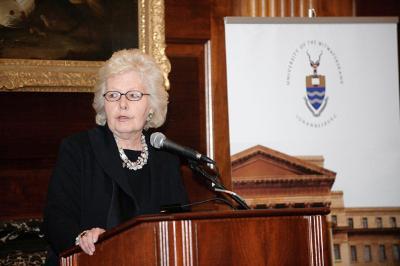2021 Bolch Prize to be awarded to Justice Margaret Marshall
-
Wits graduate to receive award for defending the rule of law all her life.
Retired Chief Justice Margaret H Marshall (BA 1967, LLD honoris causa 2000) — former chief justice of the Massachusetts Supreme Judicial Court and a lifelong advocate for a more accountable judiciary — will receive the 2021 Bolch Prize for the Rule of Law. 
An announcement made by David F Levi, the director of the Bolch Judicial Institute at Duke Law School, on 7 April 2021, said: “Chief Justice Marshall is an extraordinary example of someone who has quietly and persistently worked to uphold the rule of law. Having witnessed and fought against the devastating injustices of apartheid, she has a deep sense of the ways in which the law can be used either to undermine or to protect equal treatment. She has dedicated her life to ensuring that the law in substance and administration promotes justice for all. Her example on and off the bench has inspired judges and lawyers in this country and in South Africa.”
The Bolch Prize is awarded annually to an organisation of individual who has demonstrated extraordinary dedication to the rule of law and advancing rule of law principles around the world. The recipient is selected by the Bolch Judicial Institute’s Advisory Board. The prize includes a customised artwork and a monetary award.
Marshall will be honored during a prize giving to be broadcast online in June. Former Wits Chancellor and former deputy chief justice of the Constitutional Court, Dikgang Moseneke (LLD honoris causa), will also be honoured during the ceremony as recipient of the 2020 Bolch Prize.
Marshall obtained her baccalaureate from Wits and as an undergraduate she was elected president of the National Union of South African Students (NUSAS). In 1966, NUSAS invited Martin Luther King Jr and then Senator Robert Kennedy to South Africa to address students. The South African government denied King's visa. She was present when Kennedy delivered his famous "ripple of hope" speech at the University of Cape Town. For Marshall, Kennedy's words made a huge impact.
As a student, she attended the trials of opponents of apartheid to “bear witness” to the injustices they faced under a corrupt legal system. She helped provide transportation so that families could visit loved ones incarcerated as political prisoners.
Marshall left for the United States in 1968 to pursue graduate studies at Harvard and became a US citizen in 1978 obtaining a master’s degree from Harvard and a law degree from Yale. She practiced law for 16 years in Boston and became a partner in the Boston firm of Choate, Hall & Stewart.
In 1992, she was appointed vice president and general counsel of Harvard University, the first woman to hold that position. In 1996 she was named an associate justice of the Supreme Judicial Court of Massachusetts, the oldest continuously serving appellate court in the Western Hemisphere; in 1999 she became the first woman to serve as chief justice of that court.
Her 2003 opinion in Goodridge vs Department of Public Health made global headlines, sparking both criticism and praise. While some states moved to bar same-sex marriage after Goodridge, public opinion began to shift in support of same-sex marriage and several other states moved to legalise it. In 2015, the US Supreme Court extended the right to same-sex marriage to all US states and territories in Obergefell vs Hodges.
“Chief Justice Marshall stands high in the ranks of internationally renowned jurists,” said Justice Edwin Cameron, a retired justice of the Constitutional Court. “Her stout-hearted defense of reason, justice, equality and fairness is crucial in these perilous times — not only in her country of birth, South Africa, but in her adopted United States of America. As a proudly gay man, I can never forget the awed admiration I felt when, for a sharply divided court, she handed down her eloquent judicial affirmation, the first ever of the right to equal marriage for LGBTIQ people. That tiny fragment of her courageous legacy well encapsulated the unflinching whole.”
Watch the conversation between former deputy chief justice of the Constitutional Court, Dikgang Moseneke (LLD honoris causa) and retired chief justice of the Massachusetts Supreme Court Margaret Marshall (BA 1967, LLD honoris causa 2000) here.


